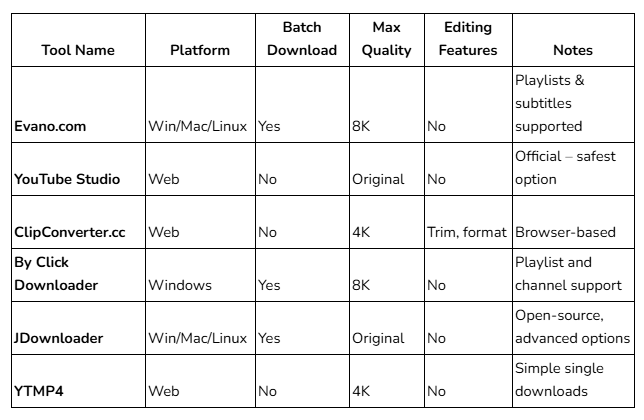YouTube to MP4 for Creators: Repurposing Content Legally
By PAGE Editor
Repurpose YouTube Content: Convert to MP4 Legally
A guide for creators on converting your own YouTube videos to MP4 for social sharing, edits, and more.
MP4 is the go-to format for editing, sharing, and archiving videos. Whether you're a vlogger, educator, marketer, or influencer, converting your own YouTube content to MP4 lets you:
✂️ Edit and repackage videos for different platforms
🎞 Create highlight reels, teasers, or compilations
🌐 Share across social media, websites, or email
💾 Maintain backups and archives
🤝 Collaborate using industry-standard formats
Repurposing your own content in MP4 boosts your creative flexibility and maximises the value of your work.
Legal Considerations Before Downloading
Who Owns the Content?
By default, you own the copyright for content you create. Downloading someone else’s videos or using their content without permission violates YouTube’s Terms of Service and may infringe copyright laws.
What Is Fair Use?
✅ Applies to commentary, criticism, news, teaching, or research
❌ Is complex and context-specific—don’t assume usage without permission qualifies
✅ You can repurpose content that you own, license properly, or that’s under Creative Commons/public domain
🚨 Always respect copyright: only repurpose your own or properly licensed content.
Downloading Your Own YouTube Videos
Option 1: YouTube Studio (Single Video)
Visit studio.youtube.com and log in
Go to Content
Find the video and click the three-dot menu
Select Download – YouTube provides the MP4 file
✅ This is the official, safest method for your own content.
Option 2: Batch Download with Third‑Party Tools
For creators needing multiple downloads or additional features, trusted tools can save time:
⚙️ Always ensure you're only downloading your own videos, and verify tool credibility before use.
Editing and Repurposing MP4 Files
Editing Tips
Use tools like Adobe Premiere Pro, Final Cut Pro, or free options like DaVinci Resolve and Shotcut
Always edit from the highest-quality source to maintain clarity
Brand Polishing
Add intros, outros, watermarks, and captions
Tailor clips for platforms (e.g., vertical vs. horizontal)
Include appropriate titles, descriptions, and tags for SEO
File Export & Platform Specs
Export with platform-specific resolutions and formats
Use cloud storage or file transfer services to share with collaborators
FAQs for Content Creators
Q: Can I legally download and use any YouTube video?
A: No—only content you own, license, or that’s clearly in the public domain. Unauthorized downloads can lead to legal consequences.
Q: What’s the safest way to download my own videos?
A: Use YouTube Studio for single downloads. For batches, use reputable third-party tools—only for your own content.
Q: Are short clips from others covered by fair use?
A: Fair use may apply, but it’s not guaranteed—especially for commercial or public use. It's safest to obtain permission or use CC-licensed clips.
Q: How do I maintain high video quality?
A: Select the highest resolution during download and use high-quality editing tools that preserve bitrate and resolution.
Q: Should I avoid certain downloader tools?
A: Yes—avoid unknown or suspicious tools that may carry malware or compromise your privacy. Stick to trusted options only.
Final Takeaways for Creators
✅ Use your own videos or properly licensed content only
✅ Download via official methods where possible
✅ Use batch converters responsibly and legally
🎬 Edit smartly, optimize for each platform
⚖️ Stay informed about copyright and fair use to protect yourself
By following this guide, you can confidently and legally repurpose your YouTube content—expanding your reach and creativity without risking copyright violations.
HOW DO YOU FEEL ABOUT FASHION?
COMMENT OR TAKE OUR PAGE READER SURVEY
Featured








Rain begins to fall, and most homeowners retreat indoors, trusting their gutters to handle the deluge.